《中国传统文化》英文版3.孔子与儒家思想解析
孔子与儒家(英文介绍)

Confucianism as a religion
• Rituals for all occasions of life
– Veneration of ancestors – Meditation
• No initiation or membership • Heaven is a manifestation
• “something done with great attention to detail”
– Confucian philosophy of self discipline
Confucianism as a religion
• Confucius was not a god or a prophet
properly after death. “When your father is alive observe his intentions. When he is
deceased, model yourself on the memory of his behavior. If in 3 years after his death, you have not deviated from your father’s ways, then you
Filial Piety 孝
• Reverence and extreme respect for parents. • A huge part of Chinese culture that has been adopted into three
main religions: Confucianism, Buddhism, and Daoism. • Varies from taking care of the parents to burying them
中国传统文化考试词汇之--儒家文化Confucian Culture(中英文)

儒家文化:中国传统智慧的持久传承Confucian Culture: The EnduringWisdom of Chinese Tradition Confucian Culture, rooted in the teachings of the great Chinese philosopher Confucius, has profoundly shaped China's social values, ethics, and governance for over two millennia. This cultural legacy emphasizes the importance of filial piety, respect for elders, moral integrity, and the pursuit of wisdom.At the heart of Confucianism lies the belief in creating a harmonious society through self-cultivation and moral conduct. The five key relationships, including ruler-subject, parent-child, husband-wife, elder-younger, and friend-friend, form the foundation of Confucian ethics, guiding individuals on the path of righteousness and compassion.Confucian classics, such as the Analects, have been cherished throughout history for their profound insights into human nature and virtue. These teachings have served as a moral compass, fostering a sense of responsibility and duty among individuals in both public and private life.The enduring influence of Confucian Culture extends beyond China's borders, as neighboring countries in East Asia, like Japan and Korea, have also been profoundly influenced by its principles.In modern times, Confucianism remains an integral part of Chinese identity, providing valuable insights into maintaining social harmony and ethical conduct amidst rapid societal changes. It continues to be a source of inspiration and guidance for individuals seeking to cultivate wisdom and live a meaningful life. Confucian Culture exemplifies the timeless wisdom of Chinese tradition, offering profound philosophical perspectives that have stood the test of time.儒家文化:中国传统智慧的持久传承儒家文化,扎根于伟大的中国哲学家孔子的教诲,已经深刻地影响了中国社会的价值观、伦理道德和治理理念长达两千多年。
儒家文化英文介绍
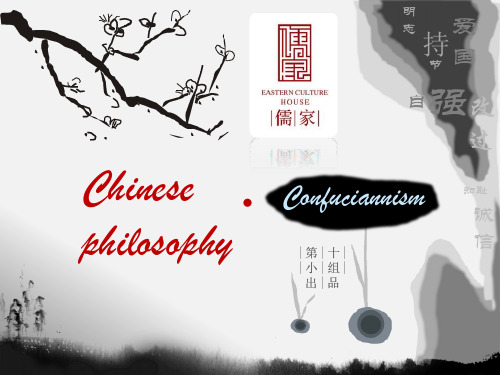
Classic of Poetry
儒
家
Core Ideology of Confucian: Ren(仁):benevolence to others—the root Yi (义):righteousness by justice—the trunk Li (礼):moral ways of conduct—the branches Zhi (智):wisdom—the flower Xin (信):trustworthiness—the fruit
Confucian classics
儒
家
Four Books
“The Great Learning”: Confucian thought of cultivating one`s morality,administer ing a country and making world peaceful
XunZi is another Confucian philosopher who lived during the Warring States period. He believed man`s inborn tendencies need to be curbed (v.限制) through education and ritual .
家
传统 文化
Chinese people are greatly influenced by Confucianism . The attitude toward living a life of the _g_ol_d_e_n_ mean can be found not only from ancient Chinese scholars,but also from almost everyone , the educated and u_n_e_d_u_c_a_t_e_d of modern China . There is a saying that whether you accept it or not, so long as you are a Chinese ,you can trace the influence__C_o_n_fu_c_i_a_n_is_m__ of in you.
关于孔子和儒家思想的英语作文
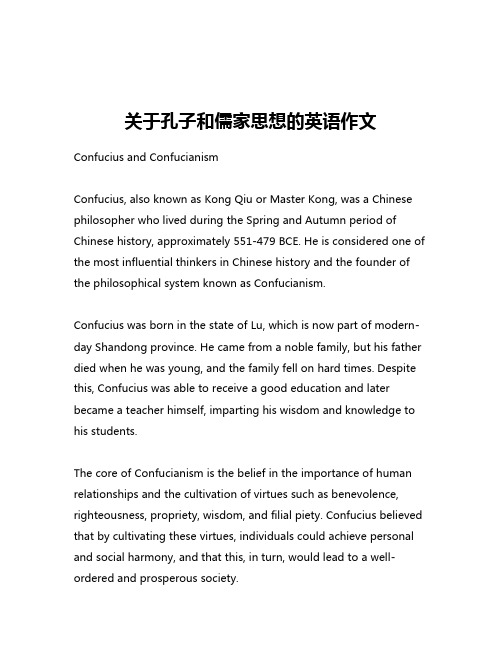
关于孔子和儒家思想的英语作文Confucius and ConfucianismConfucius, also known as Kong Qiu or Master Kong, was a Chinese philosopher who lived during the Spring and Autumn period of Chinese history, approximately 551-479 BCE. He is considered one of the most influential thinkers in Chinese history and the founder of the philosophical system known as Confucianism.Confucius was born in the state of Lu, which is now part of modern-day Shandong province. He came from a noble family, but his father died when he was young, and the family fell on hard times. Despite this, Confucius was able to receive a good education and later became a teacher himself, imparting his wisdom and knowledge to his students.The core of Confucianism is the belief in the importance of human relationships and the cultivation of virtues such as benevolence, righteousness, propriety, wisdom, and filial piety. Confucius believed that by cultivating these virtues, individuals could achieve personal and social harmony, and that this, in turn, would lead to a well-ordered and prosperous society.One of the central concepts in Confucianism is the idea of the "Mandate of Heaven," which holds that the ruler's authority is granted by Heaven (or the divine) and that the ruler must govern with virtue and benevolence in order to maintain this mandate. If the ruler fails to govern justly, then Heaven may withdraw its mandate, and the people have the right to overthrow the ruler.Another key aspect of Confucianism is the emphasis on education and self-cultivation. Confucius believed that education was essential for the development of moral character and that individuals should strive to become cultivated, virtuous, and socially responsible citizens. He also believed that the study of the Classics, which included works such as the Analects, the Book of Changes, and the Book of Rites, was crucial for this process of self-cultivation.Confucianism also places a strong emphasis on the importance of social roles and hierarchical relationships. Individuals were expected to fulfill their duties and obligations within the family and society, and to respect the authority of those in positions of power. This included the relationship between ruler and subject, father and son, and husband and wife.Despite its emphasis on hierarchy and social order, Confucianism also recognizes the importance of individual autonomy and theability of individuals to shape their own destinies. Confucius believed that individuals could cultivate their own moral character and that this would ultimately lead to a more harmonious and well-ordered society.One of the key figures in the development of Confucianism was Mencius, a disciple of Confucius who lived approximately 370-290 BCE. Mencius expanded on Confucius's ideas and argued that human nature was inherently good and that individuals could achieve moral perfection through self-cultivation and the practice of benevolence.Another important figure in the Confucian tradition was Xunzi, who lived approximately 310-230 BCE. Xunzi disagreed with Mencius's view of human nature as inherently good and argued that human nature was inherently selfish and that individuals needed to be trained and disciplined in order to cultivate virtuous behavior.Over the centuries, Confucianism has had a profound impact on Chinese culture and society, influencing everything from politics and government to education and social norms. It has also spread to other parts of East Asia, including Korea, Japan, and Vietnam, and has had a lasting impact on the cultural and intellectual traditions of these regions.Despite its enduring influence, Confucianism has also faced criticismand challenges over the years. Some have argued that its emphasis on hierarchy and social order is too rigid and restrictive, and that it fails to adequately address issues of individual rights and social justice. Others have criticized its patriarchal and hierarchical structure, and its perceived lack of attention to the needs and concerns of women and marginalized groups.Nevertheless, Confucianism remains an important and influential philosophical and cultural tradition, and its core values and teachings continue to be studied and debated by scholars and thinkers around the world. As we grapple with the challenges of the modern world, the wisdom and insights of Confucius and his followers may offer valuable lessons and perspectives that can help us navigate the complexities of human relationships, social order, and personal and societal well-being.。
儒家思想英文介绍ppt课件

(312–230 BC)
Dong zhongshu ,who is a Han Dynasty Chinese scholar, promoted Confucianism as the official ideology of the Chinese imperial state. He advocated “oust others doctrines,the overwhelming Confucianism”(罢黜百家,独尊儒术)
1.Social order and stability are based on unequal relations between people
2. Family is the pillar of the country and the society.
3.Proper social behavior consists of not treating others as you would not like to be treated yourself.
Core ideology of Confucian
ren (仁): benevolence to others — the root yi (义): righteousness by justice — the trunk li (礼): moral ways of conduct— the branches zhi (智): wisdom — the flower xin (信): trustworthiness— the fruit
DongZhongshu
Confucius(551-479 B.C.) First/given name: Qiu (丘) social/academic name: Zhongni (仲尼) lived from 551 to 479 B. C. during the Spring and Autumn Period.
儒家思想英文介绍
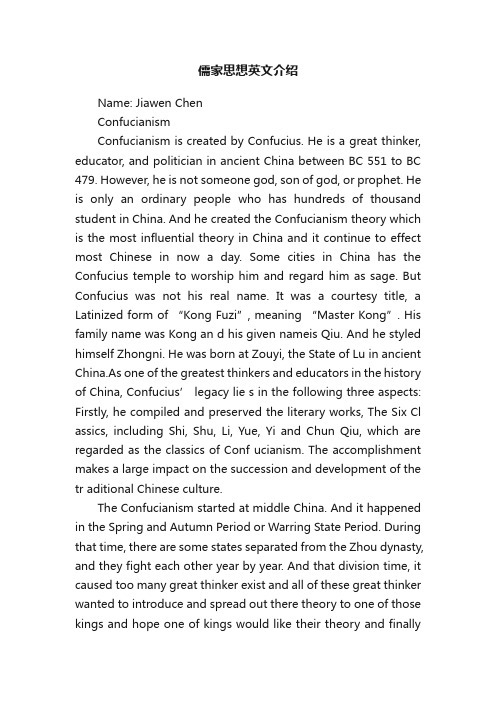
儒家思想英文介绍Name: Jiawen ChenConfucianismConfucianism is created by Confucius. He is a great thinker, educator, and politician in ancient China between BC 551 to BC 479. However, he is not someone god, son of god, or prophet. He is only an ordinary people who has hundreds of thousand student in China. And he created the Confucianism theory which is the most influential theory in China and it continue to effect most Chinese in now a day. Some cities in China has the Confucius temple to worship him and regard him as sage. But Confucius was not his real name. It was a courtesy title, a Latinized form of “Kong Fuzi”, meaning “Master Kong”. His family name was Kong an d his given nameis Qiu. And he styled himself Zhongni. He was born at Zouyi, the State of Lu in ancient China.As one of the greatest thinkers and educators in the history of China, Confucius’ legacy lie s in the following three aspects: Firstly, he compiled and preserved the literary works, The Six Cl assics, including Shi, Shu, Li, Yue, Yi and Chun Qiu, which are regarded as the classics of Conf ucianism. The accomplishment makes a large impact on the succession and development of the tr aditional Chinese culture.The Confucianism started at middle China. And it happened in the Spring and Autumn Period or Warring State Period. During that time, there are some states separated from the Zhou dynasty, and they fight each other year by year. And that division time, it caused too many great thinker exist and all of these great thinker wanted to introduce and spread out there theory to one of those kings and hope one of kings would like their theory and finallyto conquer other states, and rule the whole China. Confucianism is one of the famous theory existed in that time. Even the Qin state conquer all other states without using the Confucianism. But after Qin dynasty,Confucianism has become the mainstream theory for emperor used to rule China and educate Chinese, until today, Chinese people is still educated and effected by Confucianism.Confucius built up a system of philosophical thoughts with Ren as its basic virtue, and Ren is core theory in Confucianism and this is what Chinses want to believe. First, Ren theory can be humanity, benevolence, humanness and selflessness, and Ren is the virtue of perfectly fulfilling one's responsibilities toward others.Secondly, Confucius built up a system of philosophical thoughts with Ren as its basic virtue. This virtue is the central theme of his Analects9. He considered Ren as the first and highest criterion of man’s behavior and the core of morality. Ren meant to “love other men”;to help others to be established when one wished to be established oneself; and help others to be successful when one wished to be successful oneself. Confucius’concept of Li refers to a set of ritual and musical systems, with the hierarchical system as its core. Ren and Li are complementary: Li is the exterior principle of Ren while Ren is Li’s intrinsic guiding power. To accomplish Ren, one must abide by Li, and Ren will be naturally generated in the process of practicing Li. Fundamentally, the purpose of Confucius’ Li is to restore the traditional rites of the Zhou Dynasty.There is no certain god in Confucianism, they believe the sky is god, earth is god, we can say the nature is god, in Chinese called Tian. Chinese people worship Tian to hope they can have better future, they hope Tian can help them to achieve personalgoal. For example, if a farm worship to Tian, he might hope the weather would be comfortable for the agriculture growth. And they are also afraid Tian. Like some nature disaster happened, people would think this is a penalty for people from Tian.There is a few real believer is China, but almost Chinese were effected by Confucianism. In modern China, Confucianism is use to education in most time, but it is not like belief in China. Student would learn what Confucius said and wrote, and try to understand the theory. Because the theory is always right and accept by Chinese people, and they believe Confucianism theory can also help them be a better man if you learn Confucianism. And government also accept Confucianism as mainstream theory in society, because government also think it would help society become harmony.。
孔子与儒家(英文介绍) ppt课件
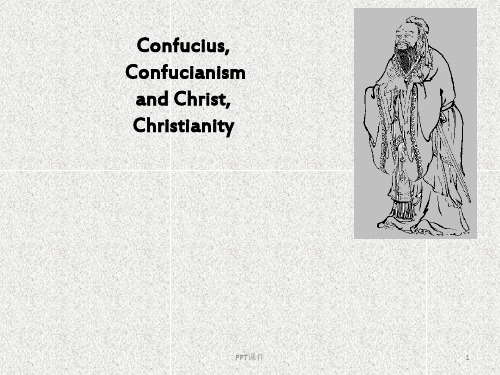
we stray – Education and self-
discipline
PPT课件
6
PPT课件
7
Confucianism as a religion
• Religion = community of people who share beliefs, cultural practices, worship a deity/deities
• “something done with great attention to detail”
– Confucian philosophy of self discipline
PPT课件
8
Confucianism as a religion
• Confucius was not a god or a prophet
PPT课件
4
Confucianism as a system of ethics
• Moral conduct is the basis of social harmony • Emphasis on self discipline and education • Obligation to family
simply because it ought to be done, not for personal gain or profit.
Basically… A person does all action for the sake of Yi because they
Basically…
A person does all actions for the sake of Jen because the respect for humanity implies the right
孔子与儒家(英文介绍)(课堂PPT)
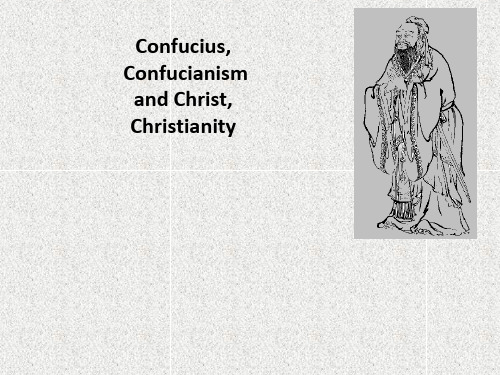
Confucius: Latinized spelling
Chinese name: • Kong Fuzi 孔夫子 • (Master Kong) • 551-479 BC titles: The First Holy One, First Teacher, Teacher of the Ten
• Collective > Individual • Humans are good, but
we stray – Education and self-
discipline
4/4/2020
4/4/2020
Jamie Buehler
Confucianism as a religion
• Religion = community of people who share beliefs, cultural practices, worship a deity/deities
• “something done with great attention to detail”
– Confucian philosophy of self discipline
4/4/2020
Confucianism as a religion
• Confucius was not a god or a prophet
• He did not create these ideas, but merely restored them
“As to being a Divine Sage or even a Good Man, far be it from me to make any such claim.”
- 1、下载文档前请自行甄别文档内容的完整性,平台不提供额外的编辑、内容补充、找答案等附加服务。
- 2、"仅部分预览"的文档,不可在线预览部分如存在完整性等问题,可反馈申请退款(可完整预览的文档不适用该条件!)。
- 3、如文档侵犯您的权益,请联系客服反馈,我们会尽快为您处理(人工客服工作时间:9:00-18:30)。
《 论 语 》
《史记· 孔子世家》
孔子17岁时,孔母颜徵在卒,他服丧三年。
则 以 学 文 《 。 学 ” 而 第 一 》
行 有 余 力 , 而 亲 仁 。 泛 爱 众 , 谨 而 信 , 出 则 弟 , “ 子 弟 曰 子 : 入 则 孝 , ——
《 论 语 》
《史记· 孔子世家》
鲁昭公之二十年,而孔子盖年三十矣。齐景 公与晏婴来适鲁,景公问孔子曰:“昔秦穆 公国小处辟,其霸何也?”对曰:“秦,国 虽小,其志大;处虽辟,行中正。身举五羖, 爵之大夫,起累绁之中,与语三日,授之以 政。以此取之,虽王可也,其霸小矣。”景 公说。
—— 《 述 而 第 七 》
子 路 不 对 。
叶 公 问 孔 子 于 子 路 ,
The Theory of Axis Time/ Era
Karl Jaspers(18831969): German psychiatrist and philosopher, a founder of modern existentialism. His works include Man and the Modern World (1931) and The Future of Mankind (1957).
Confucius and Confucianism
Personal profile
Surname: Kong Given name: Qiu Courtesy name: Zhongni English name: Confucius Sex: male Birth date: late Sep. or early Oct., 551B.C. Constellation: Libra Hobbies: reading, music Profession: thinker and educator
Top Ten of Chinese Classic Music
桓伊横笛做三弄——《梅花三弄》
《梅花落》、《梅花引》、《玉妃引》。曲 谱最早见于明代《神奇秘谱》。《晋书》称 赞了桓伊在音乐方面的突出才能,“善音乐, 尽一时之妙,为江左第一。有邕柯亭笛,常 自吹之。” 笛横江左无双客,花发东风第一枝。 相识相逢不相语,随来随去两相宜。 问世间、情为何物,只教生死相许?
敏 好 “ 子 以 古 我 曰 求 , 非 : 之 生 者 而 也 知 。 之 ” 者 ,
《 论 语 》
—— 《 公 冶 长 第 五 》
不 如 丘 之 好 学 也 。 ” 必 有 忠 信 如 丘 者 焉 , “ 子 十 曰 室 : 之 邑 ,
《 论 语 》
《史记· 孔子世家》
鲁南宫敬叔言鲁君曰:“请与孔子适周。” 鲁君与之一乘车,两马,一竖子俱,适周问 礼,盖见老子云。
孔子自周反于鲁,弟子稍益进焉。
《 述 而 第 七 》 不 知 老 之 将 至 云 尔 。 ”
乐 以 忘 忧 ,
发 愤 忘 食 ,
其 为 人 也 ,
“ 子 女 曰 奚 : 不 曰 ,
君 子 多 乎 哉 ? 不 多 也 。 ” 吾 少 也 贱 , 故 多 能 鄙 事 。 “ 太 宰 知 我 乎 !
《 子 罕 第 九 》
子 闻 之 又 多 能
子 也“ 太 贡 ?夫 宰 曰 ”子 问 : 圣 于 者 子 与 贡 ? 曰 何 : 其 多 能
古代十大名曲
《 阳 春 白 雪 》
《 汉 宫 秋 月 》
《 胡 笳 十 八 拍 》
《 渔 樵 问 答 》
《 夕 阳 箫 鼓 》
《 十 面 埋 伏 》
《 梅 花 三 弄 》
《 平 沙 落 雁 》
《 广 陵 散 》
《 高 山 流 水 》
Ancient Chinese Philosophy
The introduction of Confucius
Confucius is the founder of Confucianism. He was born in the State of Lu, known for the preservation of a wealth of historical and cultural codes and records and a complete culture of rites and music. Given such a circumstance, Confucius became a follower of past traditions and a trailblazer for future generations.
—— 《 学 而 第 一 》
其 为 仁 之 本 与 ! ” 孝 弟 也 者 , 本 立 而 道 生 。 “ 君 子 务 本 ,
有 子 曰 :
《 论 语 》
《史记· 孔子世家》
孔子要绖,季氏飨士,孔子与往。阳虎绌曰: “季氏飨士,非敢飨子也。”孔子由是退。
19岁赴宋学礼。
20岁生子,名曰鲤,字伯鱼。
—— 《 子 罕 第 九 》
七 十 而 从 心 所 欲 , 不 踰 矩 。 ” 六 十 而 耳 顺 , 五 十 而 知 天 命 , 四 十 而 不 惑 , 三 十 而 立 , “ 子 吾 曰 十 : 有 五 而 志 于 学 ,
《 论 语 》
孔子身世
《史记· 孔子世家》:“孔子生鲁昌平乡陬邑。 其先宋人也,曰孔防叔。防叔生伯夏,伯夏 生叔梁纥。纥与颜氏女徵在,祷于尼丘得孔 子。鲁襄公二十二年而孔子生。生而首上圩 顶,故因名曰丘云。字仲尼,姓孔氏。” 公元前551年9月28日<农历八月廿七>
成长经历
孔子三岁时,叔梁纥卒,孔子母子也不为施 氏(叔梁纥的正妻)所容,孔母颜徵在只好 携孔子与孟皮移居曲阜阙里,生活艰难。
